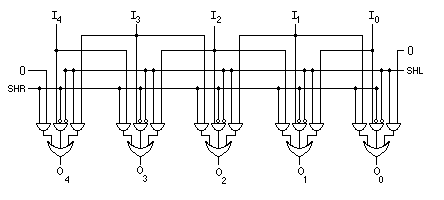Practice Exercise 6
-
Convert the following numbers from binary to decimal or decimal to
binary:
a.) 11101110100010100111012
b.) 1111111111111111111111111111111111111102
(There are 38 1's and one 0 above.)
(hint: there is an easy way to convert this.)
c.) 4,63810
-
Convert the following numbers to 2's complement binary, with various
word lengths.
a.) -7 (8 bits)
b.) -128 (8 bits)
c.) 87 (8 bits)
d.) -87 (16 bits)
e.) -1 (36 bits)
f.) -4 (80 bits)
-
The following numbers are encoded in 2's complement, either 8-bit or
16-bits. In each case, tell what the absolute value of the number is in
decimal.
a.) 10001010
b.) 1111000011110000
c.) 1111111111111000
d.) 0100000000000001
-
Do the following arithmetic operations in 8-bit 2's complement binary.
Check your numbers with decimal arithmetic to make sure that you get the
right answer.
a.) 68 + -87
b.) -101 + -36
-
Write all the bit patterns for 4-bits 2's complement, according to the
layout shown in Chapter 6.
-
Suppose you had an 8-bit computer and you did a number of additions, as
shown below. For each tell what the CNV and Z bits would be after the
operation.
a.) 10010111 C=______ N=______
+ 10001001 Z=______ V=______
-----------
1 00100000
b.) 01010111 C=______ N=______
+ 11101001 Z=______ V=______
-----------
1 01000000
c.) 00000100 C=______ N=______
+ 11111100 Z=______ V=______
-----------
1 00000000
d.) 00111011 C=______ N=______
+ 01011010 Z=______ V=______
-----------
0 10010101
-
Following are some 8-bit values to which shift operations are applied.
Write down the new values after shifting.
a.) 1 0 1 1 0 1 1 1 logical shift left 1 bit
b.) 1 0 1 1 0 1 1 1 logical shift right 1 bit
c.) 1 0 1 1 0 1 1 1 circular shift right 1 bit
d.) 1 0 1 1 0 1 1 1 arithmetic shift right 1 bit
e.) 1 0 1 1 0 1 1 1 arithmetic shift left 1 bit
-
For the following pairs of operands, apply bitwise Boolean operations.
a.) 10010001111
& 01100011101 (and)
-------------
b.) 10010001111
| 01100011101 (or)
-------------
c.) ^ 10010001111 (not)
-------------
-
Using the ASCII character set, write some C statements. Imagine that
there is a character variable called ch, declared as char ch;
a.) determine if the character in ch is printable
b.) determine if the character in ch is a printable punctuation symbol
c.) convert an uppercase letter to lowercase (don't need to check to make
sure it is uppercase first)
-
Below is the circuit for the 1-bit left and right logical shifter shown
in Fig. 2 of Chapter 6. Make modifications so that it is a circular shifter
instead. (Remember that a circular shifter does not insert 0s at the end,
but moves the end bits around.)


